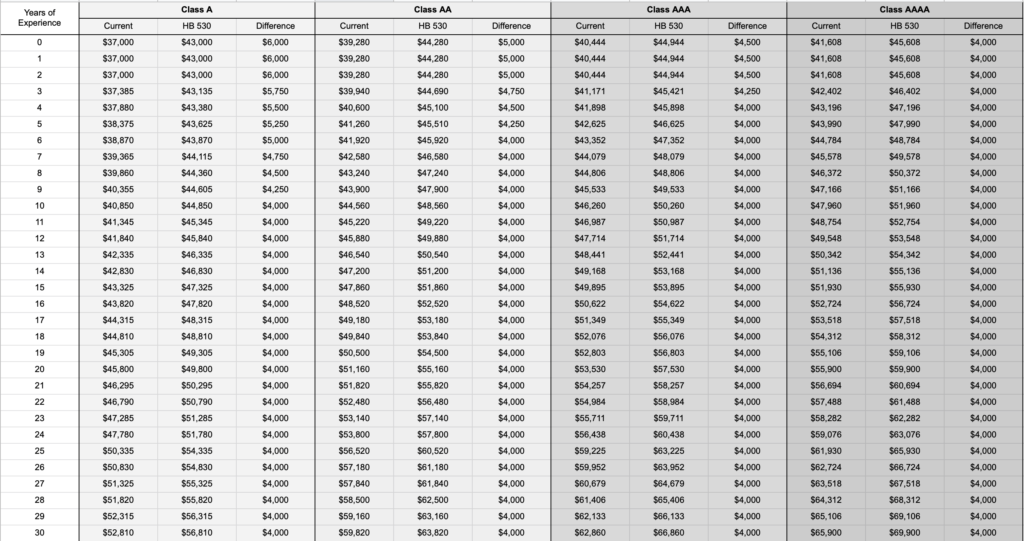Committee
Education; Appropriations
Author
Richard Bennett
Session
2022 Session
House Bill 530 would adjust the salary schedule for Mississippi public school teachers to provide a raise of at least $4,000 for all teachers, as well as a raise of up to $6,000 for some early career teachers. This would bring the starting salary for a Class A (bachelor’s degree level) teacher up to $43,000. HB 530 would also provide a raise of $2,000 for assistant teachers, bringing their salary up to $17,000.
HB 530 is one of two plans to provide a substantial raise for Mississippi public school teachers, the other being Senate Bill 2444. You can read a detailed analysis of the differences between the House and Senate plans here.
Under HB 530, the largest pay raises would go to Class A teachers in their first three years of teaching. These teachers would receive a $6,000 raise. For teachers with more experience, and for teachers with more advanced degrees (Class AA, Class AAA, and Class AAAA teachers), the raise is smaller, though every teacher would receive at least an additional $4,000. HB 530 would be scheduled to go into effect for the 2022-2023 school year and would cost an additional $219 million annually.
According to a graphic distributed by the bill’s authors, the salary schedule under HB 530 would raise the average starting salary to approximately $43,125, surpassing the regional average of $39,897. The average starting salary in Mississippi would also surpass the national average of $41,163. This substantial increase to the starting salary for Mississippi teachers would be a welcome development, particularly given the recent decline in the number of new Mississippi teachers. The across-the-board raise of at least $4,000 for all teachers would also greatly incentivize veteran teachers to remain in Mississippi classrooms at a time when the state faces a potential attrition cliff.
The differences between the current salary schedule and the schedule outlined in HB 530 are as follows:
On January 12, HB 530 overwhelmingly passed the House by a vote of 114-6. It has now been transmitted to the Senate, where the Senate Appropriations Committee and Senate Education Committee will be expected to take action on it in the coming weeks.
Updates
3/3/22 Update:
On March 1, the Senate Education and Appropriations Committees passed an amended HB 530, which now includes the Senate’s proposed salary schedule as well as a $2,000 raise (over two years) for teacher assistants. On March 2, the full Senate then passed HB 530. On March 3, rather than concur with the amended bill, the House voted to invite conference—a process in which both the House and the Senate have to name three conferees who will be tasked with working out differences and negotiating a compromise bill.
The conference committee has until March 28 to file a conference report, which the chambers can either adopt or reject. If one chamber rejects the report, they can try to recommit the bill to conference (a motion to try again) and gain a little more time to work out a deal. The very last possible day for a conference report to be filed is March 31.
HB 530 is now the only teacher pay bill that remains alive in the legislature. The House Education and Appropriations Committees declined to bring the Senate’s bill, SB 2444, up for a vote by the March 1 deadline, causing this bill to die in committee. Two other bills, HB 43 and SB 2443, which could have been used to pass a teacher pay raise (because they contain the relevant code sections) also died in committee.
For more information about this process and the amended bill, see this blog post.
3/8/22 Update:
The conferees for HB 530 have been named. On March 4, the House named Richard Bennett, Kent McCarty, and Kevin Felsher as conferees. On March 7, the Senate named Dennis DeBar, Hob Bryan, and Briggs Hopson as conferees. The six conferees have until March 28 to file a conference report, which the two chambers can either adopt or reject.
3/17 Update: On March 16, Senate and House conferees filed a conference report for HB 530. You can read our analysis of the compromise salary schedule here. The House passed the conference report on the floor. Now, we wait for the Senate. The bill would then go to Governor Tate Reeves to be signed into law. Get the details of the final proposal by grabbing this one-pager here.
3/22/22 Update:
On March 17, the Senate voted to adopt the conference report for HB 530. On March 22, the House voted to adopt the conference report. Now that both chambers have approved the conference report the bill will now go to Governor Tate Reeves to be signed into law.
3/31/22 Update:
On March 30, Governor Tate Reeves signed HB 530 into law. The salary schedule outlined in HB 530 will go into effect on July 1.


